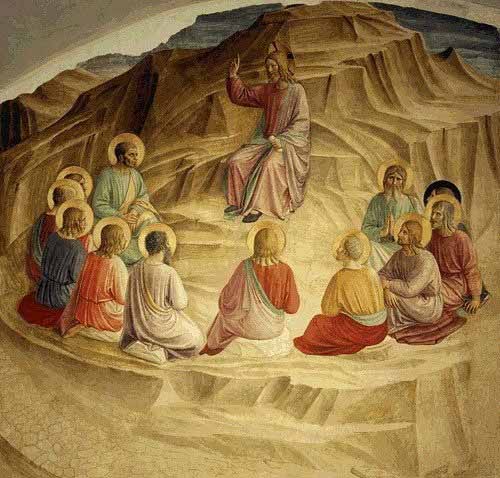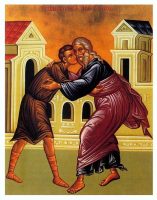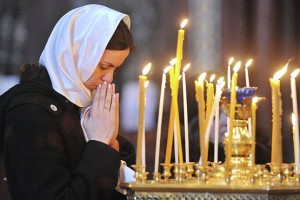The first sermon that Jesus Christ ever delivered took place right after Theophany. It’s one of the shortest sermons that He gave; yet, it’s one of the most powerful.
Many people believe that Theophany (or Epiphany) just has to do with the Baptism of Christ in the Jordan. Theophany is, however, just as the word says: Θεοφάνεια, God revealing Himself. The Son of God, Jesus Christ, was baptized in the Jordan. The Holy Spirit came in the form of a dove and the voice of the Father was heard saying, “This is My beloved Son, in whom I am well pleased!”
After Theophany, and the temptation of Christ by the devil in the desert, St. Matthew the Evangelist quotes the prophecy of Isaiah, saying that “the people who sat in darkness saw a great light” and that Jesus began to preach, saying, “Repent!” or «Μετανοείτε!»
For a person to repent, it isn’t simply saying “I’m sorry” a sin they might have committed. The Greek verb «μετανοώ» literally means “I change my mind”. Jesus was guiding people to change their minds – change their relationship with God, with their fellow man and with themselves. The rest of Jesus’ ministry – at the Cross and death, His Resurrection and even until today – was about people changing, having an internal μεταμόρφωσις (or, transfiguration) and having God as the centre of their lives.
This call to repentance by Christ began with a message, a sermon. That is why the sermon is an integral part of the Divine Liturgy – and of the divine services, in general. Sermons are the way the Church tries to teach God’s eternal truths. They are to be based on the truths of the Bible, on the commentary of the Fathers and Mothers of the Church (who were such great exegetes, or interpreters of the Biblical text) and in the Holy Tradition of the Church. Sermons are there to solve any puzzles and difficulties we have with the Scriptural passage, because “Christians are not born, they become”. One should never be afraid to admit that some things puzzle us in our spiritual life; only in that way, we will be able to find out the answers to our questions.
The sermon needs to be done in the language that people understand. That is why there are two sermons in our Churches: in Greek and in English. Language should not be a barrier for any person to learn about God. Language is a God-given tool in order for people to know that God loves them abundantly – and that He holds no ethnic passport. God created all of humanity and loves us without reservation. Just as the Greek sermon should be preached every Sunday for people who do not know English, this is why there should be an English sermon every Sunday for people who don’t know Greek. It is the Christian thing to do: allowing your brother or sister in Christ to get to know Jesus in the same way you do.
Finally, the sermon is something that should not simply stay in Church, though; rather, it should begin here and should be lived as each Christian leaves the service. It should be lived by the entire family of faith, starting with all of our individual families. Starting in 2012, the Sunday School sermon is being merged with the “regular English sermon” said later on during the Divine Liturgy. This is not being done for interests of time; rather, it is being done to remind parents and children, grandparents and grandchildren, friends and family, to discuss and ask questions about the sermon. No Saint of the Church was ever content with the knowledge they knew; rather, they strove to find out more and more about Jesus Christ and His wonders. Discussing the sermon after the Divine Liturgy is a great way for families and friends to grow together in faith. When we strive to find out more about Jesus Christ, we will experience that «μετάνοια», we will change our mind, we will learn to love Him more and more every single day.
Source: Living Orthodoxy

















